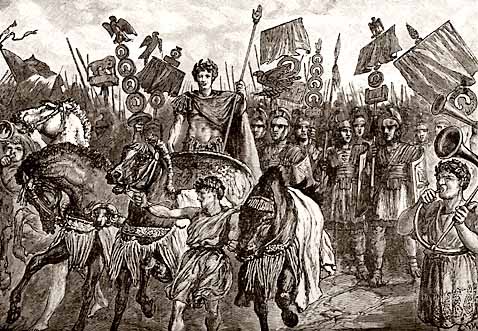
It is no wonder why statists admire the Romans so much. They see an energetic government that brought law and order to many diverse lands under laws that are the still the general foundation of our legal system.
Nor can it be argued that the Romans brought great improvements upon civilization- the invention of the aqueduct, for example brought fresh, clean water to people all across the Empire (a far better invention than a pyramid to suit some king's ambition, great architectural splendor thought it may be. Even an anonymous Roman writer said something to this effect.). It was under the Romans that the civilization of Classical and Hellenistic Greece reached their apex. Art flourished and trade boomed. The roads that the Romans built were in general use for thousands of years and some are even still used today.
Yet at one point, Rome ceased to rise, then slowly and painfully declined, and finally fell flat on its face, ushering in the Dark Ages, a time where life was short, scary, and cruel. It is no wonder why the collapse of this spectacular empire still fascinates us some 1,500 years later.
Inevitably we ask why such a great empire could fall. How did the mightiest state to ever exist up until that time, collapse so resoundingly?

There were many reasons, but for a modern example we ought to look not in the ancient past, but to our own time, for a rough equivalent exists in today's world: the United States of America. This may sound somewhat odd at first, but the path that America is on is somewhat the same as the Romans were. The similarities between the two are so striking that they even go back to the formation of the two states.
Rome had its beginnings as a city ruled by Etruscan kings. The monarchy was overthrown in 509 BC in a revolt led by Brutus. The Romans called King Tarquin a tyrant, and established a republic to prevent one man from ever attaining too much power. How similar is this to the American Revolution? Indeed, the Founding Fathers looked to the Roman Republic as a model for what they were doing, hoping to learn the lessons of the past. They saw that their revolt against King George III was strangely similar to the Roman Revolt against King Tarquin.
Both states rose and expanded. Rome slowly, but surely, conquered the Mediterranean and Western Europe by the reign of the Emperor Claudius. Rome's only major setback in this period was the crushing defeat suffered in the Teutoburg Forest at the hands of Arminius in 9 A.D. This defeat halted Rome's expansion in Europe, and except for a brief incursion by Emperor Trajan, set the permanent European boundary of the Empire. Sir Edward Creasy in his 15 Decisive Battles of the World describes this battle as a death knell to Rome, as the Elbe-Danube frontier that the conquest of Germania was meant to establish would have been a much easier border to defend then the Rhine-Danube edge that came to be fixed. The loss was so great that Augustus is reported to have screamed in his sleep: "Varus, give me back my legions!"
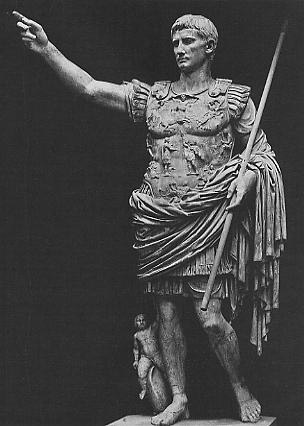

Rome recovered however, and continued to remain strong. She conquered Britain 30 years later and her economy boomed. However, this battle ended the great age of Roman conquests.
Likewise, the American military machine is the strongest to ever exist. American arms are unmatched, and we as Americans take a huge amount of foolish pride in thinking that our country has "never lost a war."

It has often been noted that our humble beginnings as a constitutional republic have been transformed into an American Empire- though an empire marked more by economics and puppet states rather than outright military conquest. The American Empire has not yet met a disastrous defeat such as that of Varus in the Teutoburg wilds, but the insurgencies in Iraq and Afghanistan have begun to push forward a much needed debate that has been lacking in this country for 60 years: is all of this foreign intervention worth it? The movement for a non-interventionist foreign policy in the advice of our founders is now beginning to take shape.
It couldn't come soon enough. As of 2007, there are 737 American military bases around the world (that we know of).
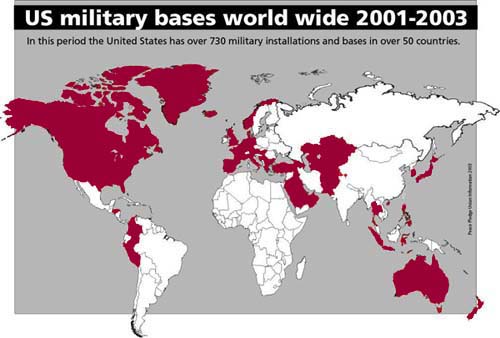
Finally, this brings us into the fall of Rome. One huge reason that the Roman Empire collapsed was due to its military instability.
There were many civil wars in Rome, while America has been fortunate enough to only have been embroiled in one. This I will grant a big difference. However, the differences stop there.
The Roman legions had a huge territory to defend. The Empire extended around the entire basin of the Mediterranean Sea, from the Atlantic Ocean to the Rhine, Danube, and Euphrates rivers to the east, south into the Sahara, and north into Scotland.

Rome never had more than 28 legions, of which, three were lost and never replaced in the disaster of the Teutoburg Forest. This brings us down to 25 legions of 5,240 men each. Rome also employed around the same number of auxiliary units, which combined gave a total of more or less 262,000 professional troops under arms at any given time
Impressive though this may be for the ancient world, the Roman Empire covered 2.2 million square miles. This amount of territory probably needed a million or more soldiers to defend it.
Thus, the Roman army was constantly stretched thin. It needed to guard against aggressors outside the Empire's vast boundaries, as well as guard against revolts, thus it needed to shift back and forth to different posts across thousands of miles of territory.
Likewise, the American military is stretched all over the world. As the Roman army was stretched to the breaking point due to the vast amount of territory it had to defend, the American military is constantly being reported as being stretched to the breaking point to fill all of these unnecessary military bases on foreign shores.
To counteract this, military spending in America has gone way up, from $333 billion in 2001, when the War in Afghanistan began, to an expected $700 billion + for the coming year.
This is not at all different from Rome. To defend its massive border, the Roman Empire had to spend hugely on its military. This drain on the economy left many disillusioned and unwilling to support the army or the state. Eventually, the amount of money coming into the Empire from taxation was simply not enough to sustain the massive Roman government.
Then, as now, to counteract this, Rome and America have turned to the same course: devaluing the currency. From here, we come to the second major reason for Rome's fall: economic.
The main currency of Rome was the Denarius, which comprised a certain amount of silver in the coinage. The other mainline currency was the gold-based Aureus, with the rate of exchange between the two being 25:1 during the empire's glory years.
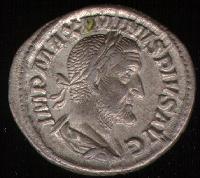
For hundreds of years, this worked fantastically. But as the glory of conquest faded (and the complementary plunder that came with it), and the price of empire rose, the Roman state found itself in a very sticky situation.
This was a big problem for Rome. As the Empire shifted to a defensive policy in the second century, it couldn't rely on the constant income that came with newly conquered territory. Eventually, taxation could no longer pay for the Empire's gargantuan expenditures, furthermore, no new discoveries of any precious metals had been made to mint new coins, and the result was that Roman emperors and bureaucrats desperately needed to find ways to plug the holes. The only option available to them was to debase the currency. (See the section entitled Rome in this source.)
As previously stated, since the beginning of Rome, the ratio of silver Denarii to the gold Aureus was 25:1. However, starting in the third century, the amount of silver content in the Denarius was greatly lowered. The Denarius (later replaced by the silver Antonius), which started out as nearly pure silver, contained only one part silver for twenty parts copper by the end of the 3rd century.
While the emperors Diocletian and Constantine tried to introduce stable monetary reforms, the expenditures of empire continued to grow and the staple silver currency of the Empire continued to be devalued.
This of course, resulted in inflation and then hyperinflation. It got so bad that what had originally started out as a 25:1 ratio of the silver Roman monetary unit to the gold rose and rose. By the time of Diocletian's reforms, one Aureus was worth 833 Denarii. Twenty years later, the ratio was 4,350:1. When Constantine converted the Aureus to the Solidus, one gold unit was worth 275,000 silver units. Only twenty years later, the ratio became 4.6 million:1!

Who did this inflation hit the hardest? Then, as now, it was the poor, as the poor could hardly afford to trade in their silver monetary unit for the gold one. To further complicate matters, Diocletian tried to institute price controls. This hope to counteract inflation failed miserably.
The Roman economy, once a juggernaut of envy, was thoroughly destroyed by the central planning of emperors and bureaucrats who couldn't resist spending lavishly. Does all of this sound familiar to you?
In 2009, America is in the midst of a grand economic crisis. Predictably, we hear politicians ranting and raving about the need to "solve" the problem. As always, they blame the "greed and corruption" of the so-called free market (of which this country has not had for many decades) for the economic instability.
In reality, for the proper place to assign blame they need only look into a mirror. This country too, has spent beyond its means for a very long time. Like the Romans, the expenditures of government have greatly overwhelmed the amount of revenue coming in from taxation.
Inevitably, the U.S. government is doing as the Romans have done before them: it is debasing the currency. And it has a marvelous little tool from which to do so that goes above and beyond the Romans ever dreamed (at least they actually still had some silver in the Denarius, with the gold Aureus/Solidus to back up their money!).
We call this method of currency debasement the Federal Reserve System. I could write an entire article on the fraud of this privately-owned central bank, but that is not what we are here to discuss. The article sourced above is a good place to start for the beginner.
The Federal Reserve allows for the creation of money out of thin air. This allows the government to fight two wars at once and still call for tax cuts. Politicians love this system because it gives them an unlimited amount of money at the ready to spend on their pet projects. When we look at this system, it ought to come as no surprise that this access to cheap money-for-nothing and the removal of the dollar from the gold standard which it fostered, has robbed the dollar of 95% of its purchasing power since the Fed's inception.
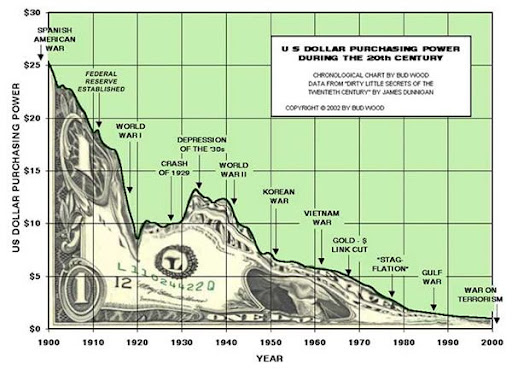
The "free market" is not at fault for this economic crisis, it is the all-too-predictable result of government intervention in keeping interest rates artificially low (an effort in housing price control that is like Diocletian's failed Edict on Prices), and the so-called business cycle that takes place as a result of the inflation-creating fiat money system imposed on us by government recognition of the Federal Reserve.
America is following down a dangerous path. It is almost exactly mirroring the policies that brought economic calamity to the Roman Empire and once more, has a much more powerful tool than the Romans had to do so.
What really gets me is that many of these expenditures are totally unnecessary. While the Romans somewhat had a reason for their military spending (to defend the people in the provinces that became dependent on the Empire), there is simply no need for many of these government bureaucracies and programs in a constitutional republic, the massive overseas spending that soaks many hundreds of billions of dollars a year being the best example of this. The continual creation of money by the Federal Reserve System that is required for this is set to bring massive amounts of inflation to these shores. Hyperinflation may indeed be a possibility.
The fall of Rome was a combination of many factors, but I would put economic reasons at the top of that list. When the currency goes, massive instability in a society is sure to follow. The government needs to wise up and wise up fast, for they are following down the agonizing road of decline that the Romans paved before- and dragging we the people down with them.

The third major reason for the collapse of Rome was demographic change.
When we examine the roots of this, we see that even the climate turned against Rome. The climate began to cool in around the 4th century AD. This triggered a vast migration and is termed the "Migration Period." These are the famed barbarian "invasions" of the Roman Empire that we popularly think as bringing about its downfall.
When the climate got colder, nomadic tribes on the Asian Steppe, including the Huns, migrated westward, displacing the already settled Germanic tribes in their wake. This caused pressure on Rome's frontiers, which as we know, were already very difficult to defend due to there not being enough manpower.

Due to the pressure exerted on them by the Huns, the Goths begged the Eastern Roman Emperor (by this time the Empire was officially split in two) Valens to give them refuge. The Romans assented, but imposed humiliating conditions on the Goths. These included disarmament (though this was not very successful, as Rome would soon see!) and conditions that brought them to the brink of starvation. Many Gothic children had to be sold into slavery in order to obtain food.
Not surprisingly, the Goths began an insurrection against the Eastern Roman Empire. Emperor Valens called his army and marched north to break the rebellion. He was not successful. Instead, he was crushed by the Goths at Adrianople, losing his own life in the battle.

In response, the new Emperor Theodosius formed a special treaty with the Goths, giving them land in exchange for military service when he called upon them (essentially a proto-vassalage that would later form the backbone of feudalism).
The Romans never truly accepted the Goths however, and it was only the results of Adrianople that accorded them such a special status. Gothic soldiers were subsequently used as cannon fodder for later Roman wars. In response, their new king, Alaric, did the unthinkable. He marched into Italy and sacked Rome itself.
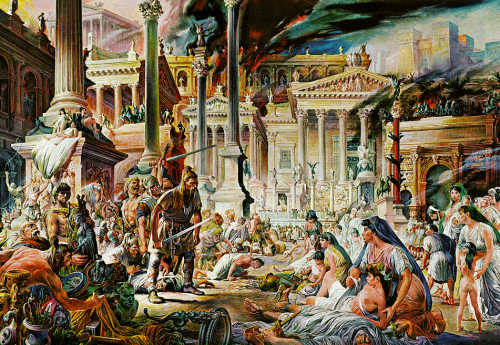
After reading about all of this chaos, it is important to know that the "barbarians" did not want to destroy the Roman Empire. On the contrary, the Germanic tribes wanted to settle there and try their hand at success. For centuries, the Empire was where the prosperity was, and they wanted their own piece of the action. However, the continual migration did have very negative side effects: whereas previous immigration into the Empire was a steady stream, the mass of humanity that the Huns pushed into the Empire's borders caused dramatic upheavals in the demographic makeup of Rome. This caused civil strife, and the authoritarian actions of the Roman state only further increased the tension.
Does this sound familiar to you? Immigration has been a hot-button issue in recent years, almost as forbidden a fruit in politics as talking about social security reform or revising abortion laws. In 2006 and 2007, attempts to pass immigration bills failed miserably.
Likewise as the Romans became more and more fragmented due to huge demographic changes, America is beginning to see the same rumblings in its own borders. While it is impossible to know for sure, the numbers of illegals in the U.S. is probably over 20 million by now. The shift in the southwest is such that we see the newcomers telling Americans that the southwest belongs to them. Not surprisingly, many of the American citizens there have begun to leave, leaving the future very much uncertain.

I realize that most of the illegal immigrants coming to America, like the Germanic tribes immigrating to Rome before them, simply want a piece of the action, a part of the American prosperity, and given my strong free market, anti-state principles, I only wish them the best in that pursuit. Indeed, if the state would simply let the marketplace work and foster a strong economy, I think many of these immigration controversies would cease.
However, there is an eery similarity here to the immigration problems of the Romans. If the state's job is to defend its "citizens" (transformed into serfs now) from outside invasion, it has failed its very reason for existence by leaps and bounds. The demographic shift in the southwest may very possibly lead to massive instability in the future that mirrors the shift in society which saw the final evaporation of the Roman state.
Let us remember that it is NAFTA (a very much anti-free market treaty) that has been acting as the modern day economic Hun, displacing Mexicans from their homes and forcing them into the United States to survive.

It is hard of course, hard to tell how this will all turn out in the end, as a vast array of factors need to be considered. I find myself sturggling to reconcile my free market principles with my desire to avoid the civil strife that I see happening if illegal immigration continues to go unchecked. I hold that I have no immediate solution to the problem, as many of the possibilities require more state involvment (amnesty, deportation, etc.).
Repealing NAFTA would be an excellent start in solving these problems, as it would give Mexicans an actual opportunity to earn a living in their own country. Ending coercive state welfare benefits that many illegals take advantage of would also be a good impetus to prevent a further flood of migrants (and would still be logically consisten libertarianism to boot!). From there, the market ought to work itself out in the end (if the government would let it).
In 476 A.D., the last Roman Emperor in the west abdicated, thus formally ending the Western Empire. The Eastern Empire would continue on for one thousand years more, and still called itself Roman until the Medieval period. But never again would there be the glorious empire of old. Never again would the Western World be so thoroughly dominated by a single power.
When contemplating the fall of Rome, we must understand that it was a failure of government that caused the collapse. I reject wholeheartedly the premise that a "decline in morality among the people" was part of the problem, and likewise, I reject that same premise today. Adultery, drunkenness, and sex orgies do not cause an overreach in power, or inflation, or authoritarian measures that antagonize the public and increase instability in society. In fact, we need more people who take part in such wild parties rather than more "public servants" that weild power over their fellow men.


Rome's problems started when the state overreached and conquered more than it could afford to, causing the need to inflate the currency to finance its military machine. Although great benefits eventually came to the provinces (such as the advance in technology), we must remember that it was by the sword that these things came. The first generations of conquered peoples were stripped of their freedom to live as they chose, and many were sold into slavery. As always, the sword always creates more problems than it solves, and hence the decline of the Empire was as sure a thing as the premise that water is wet.
It is not surprising that as power began to slip through the Empire's fingers, the fist of Rome began to tighten, some examples being Diocletian's edict on prices as well as his empire-wide persecution of Christians (due to them not paying homage to the Roman state and the divinity of the emperor, of course).
It was such authoritarian measures that triggered the Goths to rebel and Alaric to sack Rome. Had the Roman state treated them more kindly, I am sure that the market would have eventually worked out any issues among the populace, just as I am sure it will today. It is both an angering and amusing piece of news to me that people have been arrested on planes under the misnamed "Patriot Act" for arguing with flight attendants. The reasons for my anger ought to be obvious, but the news also somewhat amuses me because such authoritarian actions are an easy sign to see that America is declining just as the Romans did before.
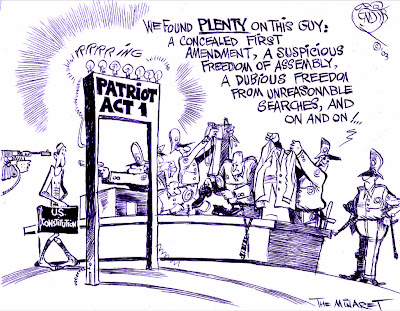
In the end, these signs are very alarming as to the future of the country, not because I am attached to the state, but because I am concerned that the government is dragging me and my fellow men down a path of chaos and woe. It was excessive government that killed Rome, and it is excessive government that is killing America.
President Obama campaigned on the words "change" and "hope." However, there can be neither if the government does not come to its senses and steer off the path first paved by Rome. Unfortunately, I see no signs of this happening.
It will be up to We the People to prevent a new collapse. We must pump the blood of liberty into the heart of a country poisoned by collectivism and a false image of national greatness to stop this madness and learn the lessons of history.

